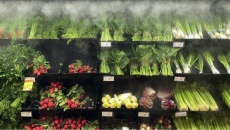Josephine Sindani’s first memory of using a food bank is a happy one.
She was eight years old and still adjusting to the shock of an Ottawa winter after recently moving from Halifax, where she and her mom arrived in Canada from Sudan about two years earlier. One day she saw her pregnant mother approaching their home, trudging through snow and carrying a “big bag of toys.”
“It's such an ingrained image in my head, just because it was such an important time and she was able to get Christmas presents and a jacket for us and food,” said Sindani, now 34 and a mother herself.
Sindani said she, her mom and two younger brothers relied on food banks off-and-on for the next five years, until her mom finished her master's degree and began working steadily.
As an adult, Sindani would return to food banks several more times – when she was a 20-year-old student in Toronto and newly pregnant; when pregnant with her second child in 2013 while launching her construction business; and most recently, in 2021 after the pandemic ground business opportunities to a halt.
Sindani teared up recalling the moment she realized her student loans were not enough to support herself and her unborn baby. She knew she should reach out for help, but feelings of shame were hard to overcome.
“I know it very, very well, and it's diminishing for your psyche and just like, your energy,” said Sindani.
“It feels like you're failing. That's what it is. It feels like you're failing. And you're not."
New data from Food Banks Canada suggests more people than ever are facing this difficult decision.
Its annual survey of food bank use in Canada recorded more than two million visits in March 2024 – nearly double the monthly visits five years ago in March 2019, and six per cent above last year's record-breaking figure.
The study, released Monday, says rapid inflation, housing costs and insufficient social supports are driving new levels of poverty and food insecurity.
That includes outsized demand from renters, racialized groups, people with disabilities, newcomers to Canada and residents across the North, and a "deeply concerning" need among seniors and families with children.
Food Banks Canada CEO Kirstin Beardsley said food banks are being pushed to “the brink” and low-income Canadians need help immediately.
The report calls on governments to introduce measures that include rent assistance and a monthly payment to low-income groups to help off-set rent and food costs.
BREAKING: Food banks record 2 million visits in one month alone for the first time in Canadian history.
— Food Banks Canada | Banques alimentaires Canada (@foodbankscanada) October 28, 2024
Check out our recently released #HungerCount2024 report for more dire findings from a system on the brink of buckling under unrelenting pressure. https://t.co/FBek0gHUTn pic.twitter.com/Ppz3HPaBAY
“HungerCount 2024” says there were 2,059,636 visits to food banks across Canada in March 2024 — up six per cent from 2023 and 90 per cent from 2019.
It says one-third of food bank clients were children — a trend that's held steady but in 2024 totalled nearly 700,000 monthly visits — while nearly one-in-five clients, or 18 per cent, were employed. Nearly 70 per cent lived in market rent housing.
One urgent recommendation is "a groceries and essentials benefit,” which Beardsley said could be achieved by rejigging the existing quarterly GST credit that goes to low-income Canadians.
“But we're asking for it to be increased and made monthly so that it can be a more predictable payment to folks who are really in need,” said Beardsley.
“It's really to offset those essential costs, the increases in rents that people are seeing, the increases in cost of essentials like food.”
Yesmil Pena, co-ordinator of a church-based food bank in north Toronto, said about 10 per cent of visitors to St. Philip Neri’s Table are older adults, most of them women. High-demand items include baby food, diapers for children and diapers for adults.
“That is a part of the population that also needs to be taken care of," she said of her oldest clients.
Pena said the food bank began in May 2021 with five clients per week, but steadily grew to serve 20, then 40, then 80 people per week. They now serve about 250 per week but see the occasional spike, such as at the end of 2023 when there were more than 300 visitors, she said.
Fellow volunteer Vanda Zanini said heavy demand often forces them to ration meat and protein, or offer alternatives.
"We reserve the milk for the children but it's a very difficult thing to do, as you can well imagine. Everybody needs protein and dairy," said Zanini.
"We do the best we can.”
In 2019, HungerCount recorded 1,086,280 monthly visits. There was no report in 2020 and monthly visits rose by 17 per cent to 1,272,580 in 2021, by 15 per cent to 1,465,721 in 2022 and by 32 per cent to 1,935,911 in 2023.
Although interest rates have dropped and inflation is slowing, Beardsley said economic relief still depends on prices coming down and wages growing.
“People need money in their pockets today," she said.
Sindani said she’s on solid enough footing to no longer need a food bank but said there’s no shame in using one. She said it's important to ask for help if struggling to afford necessities.
“There've been times where I'm just like, in my head (thinking), ‘I don't know what to do,’ and you just feel hopeless," she said.
"So it’s great having someone to smile at you and say, 'You know what, you're welcome here. Let me help you. How can I do that?' And Food Banks Canada is that person for me."






